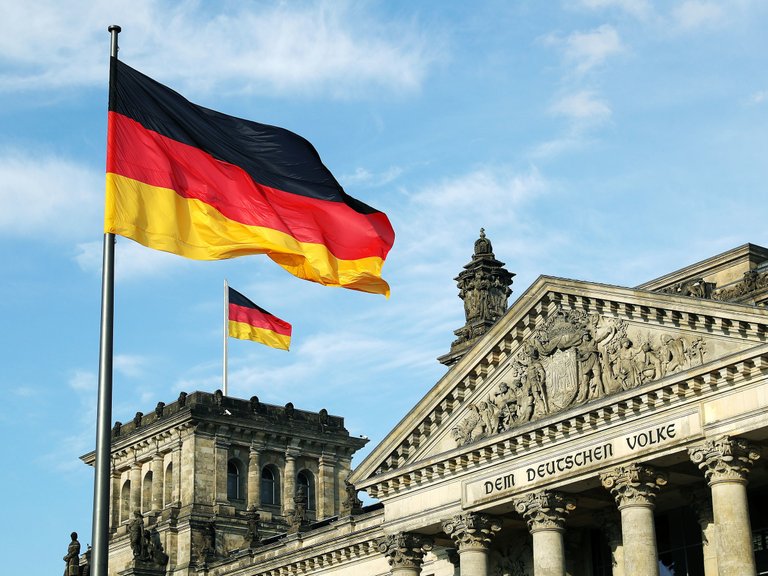Hey Steemians out there,
since a lot of people struggle to understand how political systems work I thought I would give trying to explain the system the country I live in uses a shot.

German flag in front of the Reichstag, the German seat of parliament in Berlin
The Constitution
The German constitution is called the Grundgesetz. The Grundgesetz as all constitutions lays the groundwork for all laws that follow on top of it.
Like most Western democracies Germany's political system is divided in three branches. The Legislative branch, the executive branch, and the judicial branch. Above all these branches is the Bundespräsident (President of Germany) which fits into none of these rolls but we will get to that later.
From the age of 18 all German citizens are allowed to vote in the elections for the Bundestag which is the first and more important house of the German legislative branch. The other house is the Bundesrat which is made up of delegates from the 16 state governments.
Legislative Branch
During the election of the Bundestag each German gets two votes, the first one goes directly to a candidate from his or her district, the second one goes to a party of their choosing. Whichever candidate gets the most votes in a district will get a seat in the Bundestag, it doesn't matter if he or she is of the party with the most votes in the district some of these representatives are not members of any party. After all the district winners have been assigned their seat in the Bundestag parties which have not yet reached their percentage of votes on the second vote receive seats until their share of seats represents their share of votes on the second vote. This is why it is hard to give the size of the Bundestag a number since it fluctuates from election to election and also why in general the second vote is considered more important in these elections.
Executive Branch
After the Bundestag has been assigned for a new legislative period it is tasked to appoint a Chancellor. Usually multiple parties have to enter into a coalition to achieve this since they need at least half of the votes to do so. The Chancellor assigns his Ministers himself which together with him make up the cabinet and therefore the executive branch of the government. Due to the Bundestag electing the executive branch the ruling party(s) always have a majority in the most important house of Germany.
Judicial Branch
The Bundesverfassungsgericht is highest court of law in Germany and the judicial branch of government. It is always made up of 12 judges which are proposed by the Bundesrat and elected by the Bundestag. The task of the Bundesverfassungsgericht is to make sure that new legislation and court sentences are in line with the Grundgesetz. It therefore has immense power and is very important to German lawmaking.
The President
Now let's come to the odd ball of German politics: The Bundespräsident (President of Germany). He doesn't hold any direct political power and has a purely representative role for Germany (similar to the the Queen in the UK) towards other countries and the German public. He is not elected directly by the people but rather by the Bundesversammlung which comes together only to vote for the President. The Bundesversammlung is made up half of the Bundestag and half of delegates from the state governments.
There you go, now you have a core understanding of how the German political system works. Let me know if you think this is a good system or if you would change something and if you want to know more about topics like the parties of Germany, the general tasks of the different branches of government or any other topic.
I thank you so much for reading, I know this is a very dry topic but I hope you learned something new or enjoyed it anyway.
See you soon,
insick.
Schön, dass hier immer mehr und mehr Deutsche zu sehen sind. Und guter Post.
Danke, ich werde mir Mühe geben weiter hohe Qualität zu liefern.